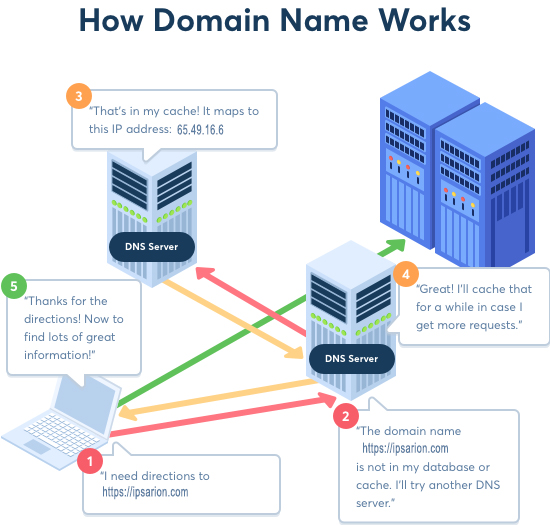A domain name is a unique name that identifies a website on the internet. It serves as an address for users to access a website, similar to a street address for a physical location.
Domain names were created to make it easier for people to access websites. Instead of having to remember a string of numbers (IP addresses), users can type in a memorable name, such as “google.com”.
When a user types a domain name into their browser, the browser contacts a Domain Name System (DNS) server to translate the domain name into an IP address. The IP address is then used to locate the server hosting the website, and the website is then loaded onto the user’s device.

The process of registering a domain name is referred to as domain name registration. In order to register a domain name, the registrant must choose a name that is not already in use and then pay an annual fee to a Domain Name Registrar, such as BlueHost or Namecheap.
Note: Most Web Hosting Companies serve as Domain Name Registers also. You can search for a domain name, register your domain name, and purchase web hosting in one place. Convenient!
Once a domain name is registered, it can be used as the main address for a website, as well as for email addresses and subdomains. For example, “info@google.com” is an email address using the domain name “google.com”.
There are various top-level domains (TLDs), such as .com, .org, .net, and country-code TLDs, such as .us (United States) and .uk (United Kingdom). The TLD indicates the type of organization or entity using the domain name and can affect the perceived credibility and authority of the website.
It is important to choose a domain name that is short, memorable, and easy to spell. A domain name can have a significant impact on the success of a website, as it helps to establish the website’s brand and identity.
In addition to domain name registration, there are also various other services that can be associated with a domain name, including website hosting, email hosting, and website-building tools.
Website hosting is the process of storing the files and data that make up a website on a server that is connected to the internet. The web hosting provider manages the server and ensures that the website is accessible to users at all times.
Email hosting allows for email addresses using the domain name to be created and managed. This is a convenient way for businesses and organizations to have professional email addresses that use their own domain name, rather than a generic email service provider.
Website-building tools are designed to help users create and manage a website, even if they have no prior experience with website development. These tools often include templates, drag-and-drop interfaces, and other features to make it easy to build a professional-looking website.
Overall, a domain name is a crucial component of any website. It serves as the website’s address and helps to establish its brand and identity. When choosing a domain name, it is important to consider factors such as length, memorability, and ease of spelling, as well as the type of TLD being used.
In conclusion, a domain name is a unique identifier for a website on the internet. It is used to translate a memorable name into an IP address, which is then used to locate the server hosting the website. The process of registering a domain name involves choosing a name that is not already in use and paying an annual fee to a domain name registrar. A domain name can also be associated with various other services, including website hosting, email hosting, and website-building tools, to help establish the website’s brand and identity.
- Unleashing the Power of InVideo AI: Revolutionizing Video Content Creation - September 9, 2023
- Jasper, the Best AI Summarizing Tool - May 5, 2023
- Tubebuddy: The Ultimate YouTube Marketing Tool - March 31, 2023




